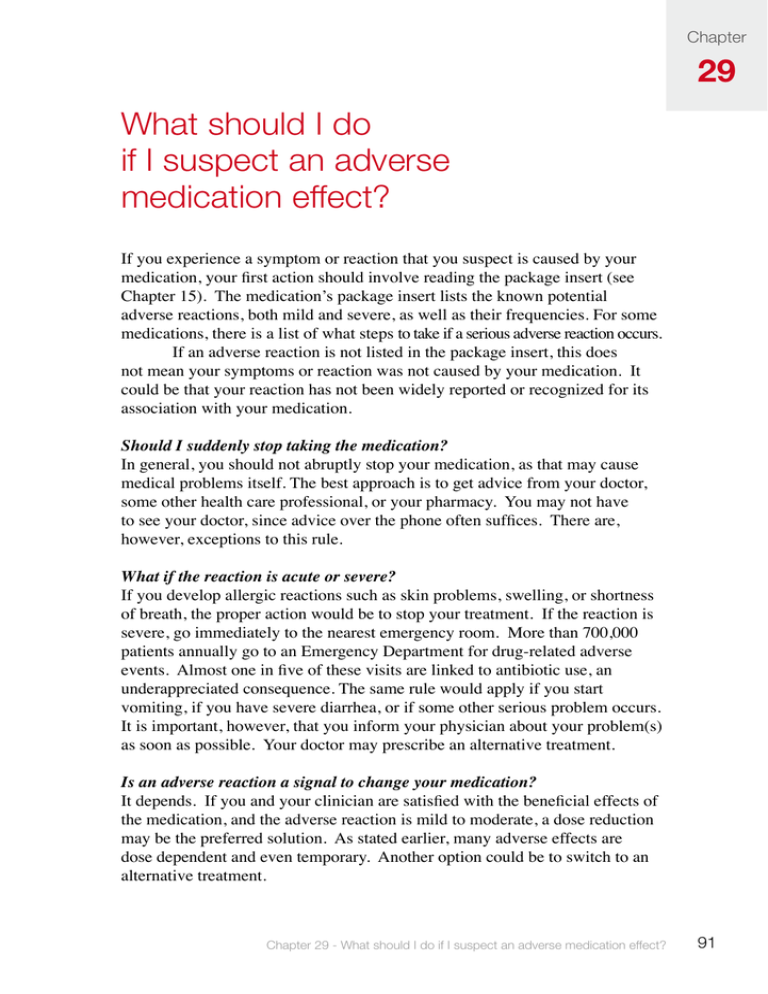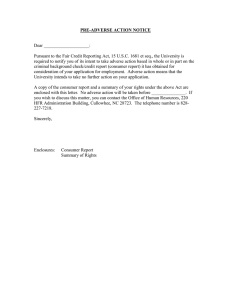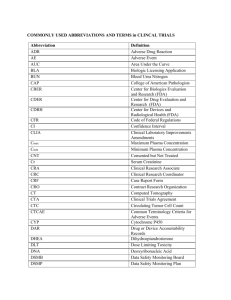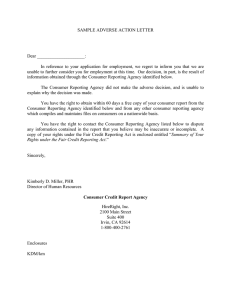29 What should I do if I suspect an adverse medication effect?
advertisement

Chapter 29 What should I do if I suspect an adverse medication effect? If you experience a symptom or reaction that you suspect is caused by your medication, your first action should involve reading the package insert (see Chapter 15). The medication’s package insert lists the known potential adverse reactions, both mild and severe, as well as their frequencies. For some medications, there is a list of what steps to take if a serious adverse reaction occurs. If an adverse reaction is not listed in the package insert, this does not mean your symptoms or reaction was not caused by your medication. It could be that your reaction has not been widely reported or recognized for its association with your medication. Should I suddenly stop taking the medication? In general, you should not abruptly stop your medication, as that may cause medical problems itself. The best approach is to get advice from your doctor, some other health care professional, or your pharmacy. You may not have to see your doctor, since advice over the phone often suffices. There are, however, exceptions to this rule. What if the reaction is acute or severe? If you develop allergic reactions such as skin problems, swelling, or shortness of breath, the proper action would be to stop your treatment. If the reaction is severe, go immediately to the nearest emergency room. More than 700,000 patients annually go to an Emergency Department for drug-related adverse events. Almost one in five of these visits are linked to antibiotic use, an underappreciated consequence. The same rule would apply if you start vomiting, if you have severe diarrhea, or if some other serious problem occurs. It is important, however, that you inform your physician about your problem(s) as soon as possible. Your doctor may prescribe an alternative treatment. Is an adverse reaction a signal to change your medication? It depends. If you and your clinician are satisfied with the beneficial effects of the medication, and the adverse reaction is mild to moderate, a dose reduction may be the preferred solution. As stated earlier, many adverse effects are dose dependent and even temporary. Another option could be to switch to an alternative treatment. Chapter 29 - What should I do if I suspect an adverse medication effect? 91 Should I report my experience to the authorities? The seriousness of the adverse reaction ought to influence your decision to report it to the FDA. If the problem is mild to modest, and especially if it is already discussed in the package insert, there is no pressing reason to report it. On the other hand, if the problem is serious (for example, you have suffered a heart attack or stroke), it ought to be reported. The FDA’s MedWatch program introduced in 1993 asks consumers and health professionals to voluntarily report serious adverse events to the agency. You can find the reporting form with instructions on the FDA Web site, at www.fda.gov/medwatch, to report a suspected adverse reaction. Pharmaceutical manufacturers are required to report suspected adverse reactions to the FDA. In 2009, the FDA received about 116,000 reports of serious adverse events. These included outcomes such as deaths, birth defects, disabilities, 92 Chapter 29 - What should I do if I suspect an adverse medication effect? hospitalizations, and other events that were life-threatening or required medical intervention. Approximately 25 percent of these were reported by consumers, and most represented well-recognized adverse events. One weakness of the FDA’s MedWatch program is that reporting is voluntary and the rate of reporting is very low. It is estimated that one to ten percent of all adverse reactions are currently reported, though the percentage is higher for serious problems. The reporting rates are much higher in countries which strongly encourage reporting of adverse events. The approach to early detection of serious adverse events is changing in the U.S. The current system of voluntary reporting is passive. Serious problems are often detected only after years of marketing, during which millions of patients have already been exposed to harmful medications. Proactive searches of drug safety problems are now underway. For example, patient databases are being linked to pharmacy records, which allows for searches and earlier detection of safety problems. Why is timely reporting so important? Due to the substantial under-reporting of serious adverse effects, it takes much longer in the U.S. to get the number of reports needed for the FDA to take action. The importance of complete patient reporting is illustrated by safety problems linked to varenicline (Chantix), a drug approved in May 2006 to help people quit smoking. As a result of under-reporting, harmful drugs such as varenicline stay on the market for years longer than they should. More timely and complete reporting would avoid delays in regulatory actions, such as restriction in use or withdrawal from the market. Faster action also would reduce the number of patients exposed to the harmful medication. On average, almost four million patients were exposed to five drugs withdrawn in the late 1990s. Approximately 20 million people had used rofecoxib (Vioxx) prior to its withdrawal from the market due to an increased risk of heart attacks. Key messages 3 If you suspect an adverse reaction to your medication, read the package insert and contact your doctor, clinic, or pharmacy if you are worried. 3 Don’t suddenly stop your medication unless you suffer an acute or serious problem. 3 Reporting of adverse reactions to the FDA, especially serious ones, is strongly encouraged. Chapter 29 - What should I do if I suspect an adverse medication effect? 93


